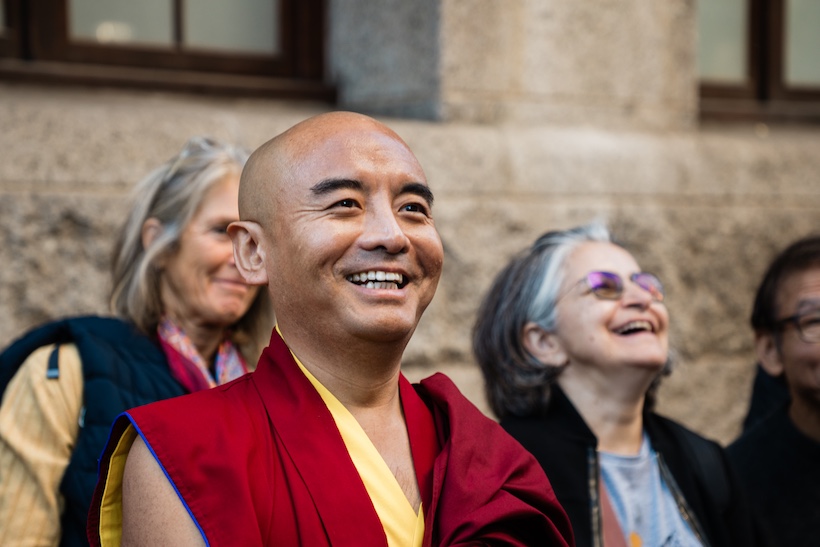Just Keep Walking
By Masha Primachenko • 2 min read

TWO AND A HALF YEARS AGO, my mother was diagnosed with glioblastoma, a very aggressive cancer. I had just returned from India at that time; it was November. She began behaving unusually — dropping things, spilling coffee on her clothes, struggling to open doors with her key, and frequently forgetting words. She seemed completely absorbed in herself, withdrawn from the outside world. Her colleague and friend, also a doctor, urged me to take her for an MRI.
On that strange day, December 12, 2022, we went for the check-up. They kept her inside for a long time. When they called me in, they showed me a considerable tumor on the scan. That was a turning point.
My mom had always been a bolt of energy, filled with curiosity for life. At 52, she learned to drive and zoomed around in her Mini Cooper. At 65, she began training in professional swimming and traveled throughout the Middle East. That vibrant version of herself was no more. Accepting this was perhaps the most difficult part. My attachment to her identity, built over the years, was incredibly strong. Now, it was time to switch roles.
I’ve received many teachings on impermanence from Mingyur Rinpoche, alongside many of you. I have taken Joy of Living Level 3 multiple times and practiced its lessons. I understand that everything changes, that there are ups and downs, and that if we break things down far enough, we ultimately find nothing.
But this time, the teaching came on a different level. I was pushed into a corner and had to confront great impermanence directly.
And what did I find? Something beyond change. In these moments, it became clear: everything changes, but the warm energy of our true nature will always be with us. We can rely on it and connect with it at any time. We don’t have to wait for difficult moments.
I also discovered a surge of creativity that accompanies change. I suddenly became inventive in finding ways to support my mother while juggling my own life. This type of compassion can move mountains. Rinpoche compares it to the power of an atomic bomb. I am convinced that compassion triggers creativity; they go hand in hand. That includes self-compassion, too. As a leader, caretaker, and parent, I need to recharge to truly care for others.
I realize that there will be many more difficult moments ahead, and I need to prepare for them. Rinpoche’s teachings on acceptance resonate deeply with me. Problems and difficulties are normal, and I am working to normalize them rather than treating them as exceptions, waiting for the elusive perfect moment when everything is resolved. I think I’ve started to complain a little less. Of course, I still feel overwhelmed at times, and that’s okay — it’s normal too.
Suffering is universal. I’m in a brain tumor chat on my phone with hundreds of people sharing their stories, treatment plans, hopes, and fears. They come from all walks of life — different ages, genders, and backgrounds.
We are each on our own path — a journey of self-transformation through whatever life throws our way. You never know if it’s a curse or a blessing. As Tsoknyi Rinpoche, Mingyur Rinpoche’s older brother, often says: Just keep walking.

Masha Primachenko turned to meditation to manage her anxiety and panic attacks. In 2012, she stumbled upon a YouTube video by Mingyur Rinpoche discussing panic attacks, and it really resonated with her. After meeting Mingyur Rinpoche in Bodhgaya in 2014, following his wandering retreat, she chose him as her main teacher. Masha is now a senior facilitator and one of the leaders of the Tergar Russia community. Professionally, she works in advertising and communication, currently serving as the Marketing and Communication Director for Tergar International. In her free time, Masha enjoys being outdoors with her family and traveling across India and Asia.
Learn meditation under the skillful guidance of world-renowned teacher Yongey Mingyur Rinpoche at your own pace.


“I kept worrying about my “incorrect” meditation practice. I just knew I was not doing it right! This feeling remained an undercurrent — not debilitating but present — until I encountered the Joy of Living with Mingyur Rinpoche.” — Ingrid White-Wilson

Mingyur Rinpoche’s 2025 visit to South Africa brought together decades of Buddhist practice and fresh inspiration for a growing meditation community.

“Looking again at that busy train station, I can recognize that just like me, everyone who’s running around is identifying with this solid sense of self, and they’re also saying, “If I just get this one thing!” – Anya Adair
If you enjoyed reading our articles, please join our mailing list and we’ll send you our news and latest pieces.